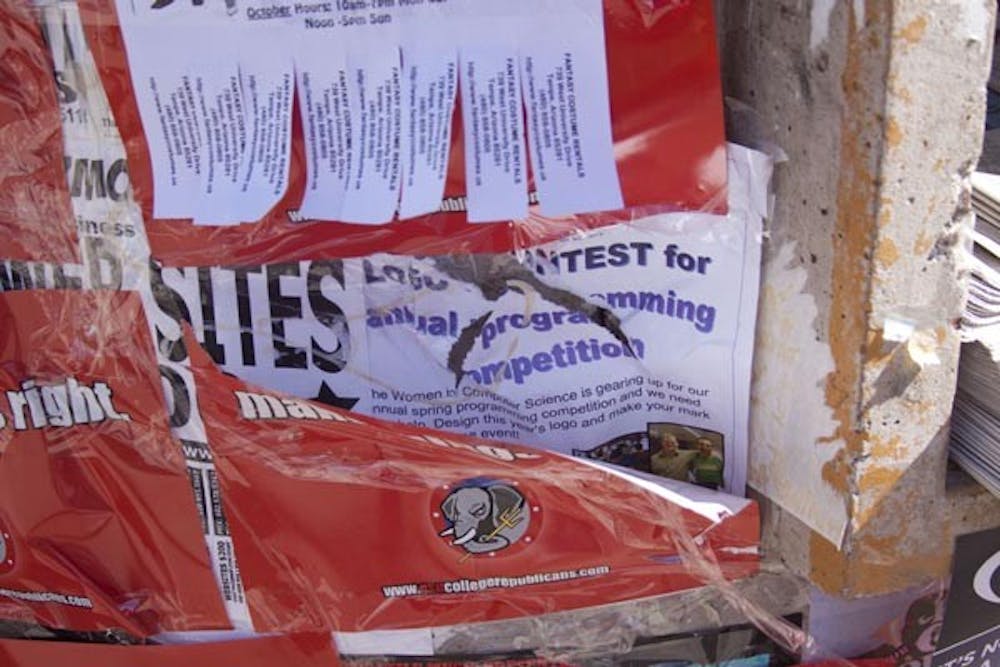Posters and signs cover the kiosks on ASU’s Tempe campus as an example of how student groups can exercise their First Amendment right to free speech.
But some ASU political groups and student activists say they express their views one day only to see them torn down the next.
Officials from ASU’s College Republicans, Young Democrats and volunteers from Organizing for America said this is an ongoing issue. Some say it should be addressed, while others say it promotes competition.
Organizing for America is a national group that works to promote and support the agenda of President Barack Obama.
ASU College Republicans President Tyler Bowyer said his group recently launched a campus ad campaign calling this midterm election a second chance to “make things right.”
Those signs, however, didn’t last long.
“I don’t know who exactly it was, but it looked like they had taken down a lot of the posters and fliers we had put up on the kiosks,” Bowyer said. “We didn’t catch them in the act.”
The “kiosks” in the public spaces are often covered with signs advertising student jobs, concerts and services. Bowyer said his group completely covered those kiosks with their signs.
The College Republicans found it funny, he said, that people would resort to tearing down signs that deliver a message they don’t agree with.
“It’s one of those things; there are always going to be people out there who want to inhibit free speech,” Bowyer said. “It’s something that needs to be addressed.”
The College Republicans reported posting about 50 free-standing ads with a similar message in September, all of which either went missing or were vandalized.
“They disappeared almost overnight,” Bowyer said. “It’s something that happens so often, we’re used to it.”
Bowyer said seeing their signs torn down was exciting.
“[We] see people taking our signs down, and that’s even more motivation to keep doing what we do,” he said. “It’s a great way to look at things … we have a lot of faith.”
Damien Maloney, a representative for Organizing for America, said he and other volunteers have covered the kiosks several times for this midterm election.
“We have been in a battle with the College Republicans,” he said.
The two groups have been papering over one another’s fliers on the kiosks since last Thursday, said Maloney, who worked for The State Press last fall.
“The competition is good for visibility,” he said.
A Student Development policy that went into effect in 1984 and was revised in 1999 states that posters can be displayed on kiosks if the signage “is not posted on a kiosk with more than one other poster advertising that same activity.”
Covering an entire kiosk with the same sign goes against the language of this policy, something that officials from Organizing for America and College Republicans were not aware of.
Maloney said unknown people have also torn down Organizing for America’s signs from a kiosk near the Social Sciences Building by Hayden Lawn.
ASU Young Democrats President Erica Pederson said at the beginning of the year the club had almost 25 free-standing signs disappear in two days.
These signs cost about $1.50 to $2 each and the club only allocates $200 to $300 a year toward publicity.
She said when the club accidentally places their signs in areas that violate ASU policy, they receive a call from ASU Facilities Management and they have the opportunity to pick up their signs.
At the beginning of the semester they did not receive a call, she said, leading them to believe Facilities Management had not taken down their signs.
“The most upsetting thing about getting signs torn down is the time and effort wasted,” Young said.
ASU spokeswoman Sharon Keeler said University officials do not oversee the placement of signs on the kiosks.
As far as some students tearing down signs, Keeler said, “I think that’s in bad taste, but I don’t think there’s any policy against it.”
Grounds officials completely clear off the kiosks at the end of every semester, and will do periodic checks to make sure signs with old dates or inappropriate material are taken down, said Rick Pretzman, associate director of Energy and Utilities at ASU.
Grounds officials have the authority to decide what is inappropriate for public display.
“It’s kind of at the discretion of grounds as far as cleaning those off,” Pretzman said. “They know what to look for as far as keeping the campus looking nice.”
Pederson said despite people interfering with the Young Democrats’ initiative to promote civil engagement, they would continue to post their signs.
“We just try harder to get the word out,” she said.
Reach the reporters at ymgonzal@asu.edu and mary.shinn@asu.edu





